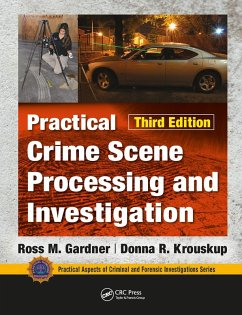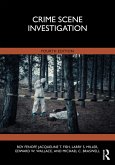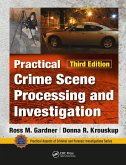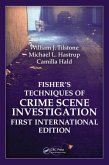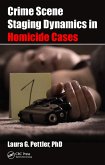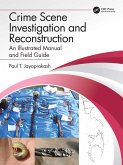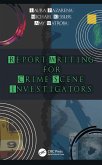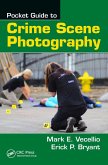Ross M. Gardner, Donna Krouskup
Practical Crime Scene Processing and Investigation, Third Edition (eBook, PDF)
70,95 €
70,95 €
inkl. MwSt.
Sofort per Download lieferbar

35 °P sammeln
70,95 €
Als Download kaufen

70,95 €
inkl. MwSt.
Sofort per Download lieferbar

35 °P sammeln
Jetzt verschenken
Alle Infos zum eBook verschenken
70,95 €
inkl. MwSt.
Sofort per Download lieferbar
Alle Infos zum eBook verschenken

35 °P sammeln
Ross M. Gardner, Donna Krouskup
Practical Crime Scene Processing and Investigation, Third Edition (eBook, PDF)
- Format: PDF
- Merkliste
- Auf die Merkliste
- Bewerten Bewerten
- Teilen
- Produkt teilen
- Produkterinnerung
- Produkterinnerung

Bitte loggen Sie sich zunächst in Ihr Kundenkonto ein oder registrieren Sie sich bei
bücher.de, um das eBook-Abo tolino select nutzen zu können.
Hier können Sie sich einloggen
Hier können Sie sich einloggen
Sie sind bereits eingeloggt. Klicken Sie auf 2. tolino select Abo, um fortzufahren.

Bitte loggen Sie sich zunächst in Ihr Kundenkonto ein oder registrieren Sie sich bei bücher.de, um das eBook-Abo tolino select nutzen zu können.
Practice Crime Scene Processing and Investigation, Third Edition provides the essential tools for what crime scene investigators need to know, what they need to do, and how to do it.
- Geräte: PC
- mit Kopierschutz
- eBook Hilfe
- Größe: 216.42MB
Andere Kunden interessierten sich auch für
![Crime Scene Investigation (eBook, PDF) Crime Scene Investigation (eBook, PDF)]() Roy FenoffCrime Scene Investigation (eBook, PDF)74,95 €
Roy FenoffCrime Scene Investigation (eBook, PDF)74,95 €![Practical Crime Scene Processing and Investigation, Third Edition (eBook, ePUB) Practical Crime Scene Processing and Investigation, Third Edition (eBook, ePUB)]() Ross M. GardnerPractical Crime Scene Processing and Investigation, Third Edition (eBook, ePUB)70,95 €
Ross M. GardnerPractical Crime Scene Processing and Investigation, Third Edition (eBook, ePUB)70,95 €![Fisher¿s Techniques of Crime Scene Investigation First International Edition (eBook, PDF) Fisher¿s Techniques of Crime Scene Investigation First International Edition (eBook, PDF)]() William J. TilstoneFisher¿s Techniques of Crime Scene Investigation First International Edition (eBook, PDF)182,95 €
William J. TilstoneFisher¿s Techniques of Crime Scene Investigation First International Edition (eBook, PDF)182,95 €![Crime Scene Staging Dynamics in Homicide Cases (eBook, PDF) Crime Scene Staging Dynamics in Homicide Cases (eBook, PDF)]() Laura Gail PettlerCrime Scene Staging Dynamics in Homicide Cases (eBook, PDF)34,95 €
Laura Gail PettlerCrime Scene Staging Dynamics in Homicide Cases (eBook, PDF)34,95 €![Crime Scene Investigation and Reconstruction (eBook, PDF) Crime Scene Investigation and Reconstruction (eBook, PDF)]() Paul T. JayaprakashCrime Scene Investigation and Reconstruction (eBook, PDF)68,95 €
Paul T. JayaprakashCrime Scene Investigation and Reconstruction (eBook, PDF)68,95 €![Report Writing for Crime Scene Investigators (eBook, PDF) Report Writing for Crime Scene Investigators (eBook, PDF)]() Laura PazarenaReport Writing for Crime Scene Investigators (eBook, PDF)51,95 €
Laura PazarenaReport Writing for Crime Scene Investigators (eBook, PDF)51,95 €![Pocket Guide to Crime Scene Photography (eBook, PDF) Pocket Guide to Crime Scene Photography (eBook, PDF)]() Mark E. VecellioPocket Guide to Crime Scene Photography (eBook, PDF)30,95 €
Mark E. VecellioPocket Guide to Crime Scene Photography (eBook, PDF)30,95 €-
-
-
Practice Crime Scene Processing and Investigation, Third Edition provides the essential tools for what crime scene investigators need to know, what they need to do, and how to do it.
Dieser Download kann aus rechtlichen Gründen nur mit Rechnungsadresse in A, B, BG, CY, CZ, D, DK, EW, E, FIN, F, GR, HR, H, IRL, I, LT, L, LR, M, NL, PL, P, R, S, SLO, SK ausgeliefert werden.
Produktdetails
- Produktdetails
- Verlag: Taylor & Francis
- Seitenzahl: 429
- Erscheinungstermin: 20. September 2018
- Englisch
- ISBN-13: 9781351692380
- Artikelnr.: 54272528
- Verlag: Taylor & Francis
- Seitenzahl: 429
- Erscheinungstermin: 20. September 2018
- Englisch
- ISBN-13: 9781351692380
- Artikelnr.: 54272528
Ross Martin Gardner worked in law enforcement for nearly 29 years. The vast majority of that period was spent with the U.S. Army Criminal Investigation Command, performing duties as a special agent and command sergeant major. In 1999, Ross retired from the military to take a position as a chief of police in a small suburban Atlanta police department. He served in that position until 2003, when he quit public service to become a full-time consultant and instructor. Ross is currently the vice president of Bevel, Gardner, and Associates, a forensic education and consulting group.
Ross holds a master's degree in computer and information systems management from Webster University, a Bachelor of Science degree in criminal justice from Wayland Baptist College, and an associate's degree in police science from Central Texas College. In 1985 he attended and graduated first in his class from the Scenes of Crime Officers Course, New Scotland Yard. Between 1988 and 1996 he served as an adjunct professor for Central Texas College. He is a member of a number of professional associations and has served in a variety of positions, including president of the Rocky Mountain Association of Bloodstain Pattern Analysts (RMABPA), president of the Association of Crime Scene Reconstruction (ACSR), chairman of the Education committee for both the RMABPA and the International Association of Bloodstain Pattern Analysts (IABPA), and chairman of the Taxonomy and Terminology Committee Scientific Workgroup on Bloodstain Pattern Analysis (SWGSTAIN).
Ross is certified as a senior crime scene analyst by the International Association for Identification and is an active instructor in crime scene processing, crime scene analysis, and bloodstain pattern analysis. Throughout his career he has taught for police agencies (national and international), police academies, law enforcement professional associations, and trial counsel professional associations, and has written a number of articles. He has qualified as an expert in bloodstain pattern analysis and crime scene analysis in both state and federal court. Ross co-wrote Bloodstain Pattern Analysis: With an Introduction to Crime Scene Reconstruction, 3rd edition, and Practical Crime Scene Analysis and Reconstruction with Captain Tom Bevel (Ret.), OKC PD. In 2007, Ross contributed a chapter to the Wiley Forensic Encyclopedia.
Donna Krouskup has been with the Denton County Police Department in Texas since 2004 and a Crime Scene Investigator since 2008. She holds a Bachelors of Arts in Chemistry from the University of North Texas and has extensive training and experience in various aspects of crime scenes investigation including: latent print development, sexual assault investigations, 3D laser scanners, digital imaging and video recovery, forensic photography, death investigation, shooting incident reconstruction, and bloodstain pattern analysis.. She is a member of both the International Association of Bloodstain Pattern Analysts (IABPA) and the Texas Division of the International Association for Identification (TXIAI).
Ross holds a master's degree in computer and information systems management from Webster University, a Bachelor of Science degree in criminal justice from Wayland Baptist College, and an associate's degree in police science from Central Texas College. In 1985 he attended and graduated first in his class from the Scenes of Crime Officers Course, New Scotland Yard. Between 1988 and 1996 he served as an adjunct professor for Central Texas College. He is a member of a number of professional associations and has served in a variety of positions, including president of the Rocky Mountain Association of Bloodstain Pattern Analysts (RMABPA), president of the Association of Crime Scene Reconstruction (ACSR), chairman of the Education committee for both the RMABPA and the International Association of Bloodstain Pattern Analysts (IABPA), and chairman of the Taxonomy and Terminology Committee Scientific Workgroup on Bloodstain Pattern Analysis (SWGSTAIN).
Ross is certified as a senior crime scene analyst by the International Association for Identification and is an active instructor in crime scene processing, crime scene analysis, and bloodstain pattern analysis. Throughout his career he has taught for police agencies (national and international), police academies, law enforcement professional associations, and trial counsel professional associations, and has written a number of articles. He has qualified as an expert in bloodstain pattern analysis and crime scene analysis in both state and federal court. Ross co-wrote Bloodstain Pattern Analysis: With an Introduction to Crime Scene Reconstruction, 3rd edition, and Practical Crime Scene Analysis and Reconstruction with Captain Tom Bevel (Ret.), OKC PD. In 2007, Ross contributed a chapter to the Wiley Forensic Encyclopedia.
Donna Krouskup has been with the Denton County Police Department in Texas since 2004 and a Crime Scene Investigator since 2008. She holds a Bachelors of Arts in Chemistry from the University of North Texas and has extensive training and experience in various aspects of crime scenes investigation including: latent print development, sexual assault investigations, 3D laser scanners, digital imaging and video recovery, forensic photography, death investigation, shooting incident reconstruction, and bloodstain pattern analysis.. She is a member of both the International Association of Bloodstain Pattern Analysts (IABPA) and the Texas Division of the International Association for Identification (TXIAI).
1. Introduction 2. Understanding the Nature of Physical Evidence 3. Actions
of the Initial Responding Officer 4. Processing Methodology 5. Assessing
the Scene 6. Crime Scene Photography 7. Crime Scene Sketching and Mapping
8. Narrative Descriptions: Crime Scene Notes and Reports 9. Basic Skills
for Scene Processing - Light Technology 10. Basic Skills for Scene
Processing - Fingerprint Evidence 11. Basic Skills for Scene Processing -
Impression Evidence 12. Shooting Scene Documentation and Reconstruction 13.
Applying Bloodstain Pattern Analysis in the Crime Scene 14. Special Scene
Considerations 15. The Body as a Crime Scene 16. The Role of Crime Scene
Analysis and Reconstruction Appendix A. Crime Scene Equipment Appendix B.
Risk Management Appendix C. Miscellaneous Forms
of the Initial Responding Officer 4. Processing Methodology 5. Assessing
the Scene 6. Crime Scene Photography 7. Crime Scene Sketching and Mapping
8. Narrative Descriptions: Crime Scene Notes and Reports 9. Basic Skills
for Scene Processing - Light Technology 10. Basic Skills for Scene
Processing - Fingerprint Evidence 11. Basic Skills for Scene Processing -
Impression Evidence 12. Shooting Scene Documentation and Reconstruction 13.
Applying Bloodstain Pattern Analysis in the Crime Scene 14. Special Scene
Considerations 15. The Body as a Crime Scene 16. The Role of Crime Scene
Analysis and Reconstruction Appendix A. Crime Scene Equipment Appendix B.
Risk Management Appendix C. Miscellaneous Forms
1. Introduction 2. Understanding the Nature of Physical Evidence 3. Actions
of the Initial Responding Officer 4. Processing Methodology 5. Assessing
the Scene 6. Crime Scene Photography 7. Crime Scene Sketching and Mapping
8. Narrative Descriptions: Crime Scene Notes and Reports 9. Basic Skills
for Scene Processing - Light Technology 10. Basic Skills for Scene
Processing - Fingerprint Evidence 11. Basic Skills for Scene Processing -
Impression Evidence 12. Shooting Scene Documentation and Reconstruction 13.
Applying Bloodstain Pattern Analysis in the Crime Scene 14. Special Scene
Considerations 15. The Body as a Crime Scene 16. The Role of Crime Scene
Analysis and Reconstruction Appendix A. Crime Scene Equipment Appendix B.
Risk Management Appendix C. Miscellaneous Forms
of the Initial Responding Officer 4. Processing Methodology 5. Assessing
the Scene 6. Crime Scene Photography 7. Crime Scene Sketching and Mapping
8. Narrative Descriptions: Crime Scene Notes and Reports 9. Basic Skills
for Scene Processing - Light Technology 10. Basic Skills for Scene
Processing - Fingerprint Evidence 11. Basic Skills for Scene Processing -
Impression Evidence 12. Shooting Scene Documentation and Reconstruction 13.
Applying Bloodstain Pattern Analysis in the Crime Scene 14. Special Scene
Considerations 15. The Body as a Crime Scene 16. The Role of Crime Scene
Analysis and Reconstruction Appendix A. Crime Scene Equipment Appendix B.
Risk Management Appendix C. Miscellaneous Forms
